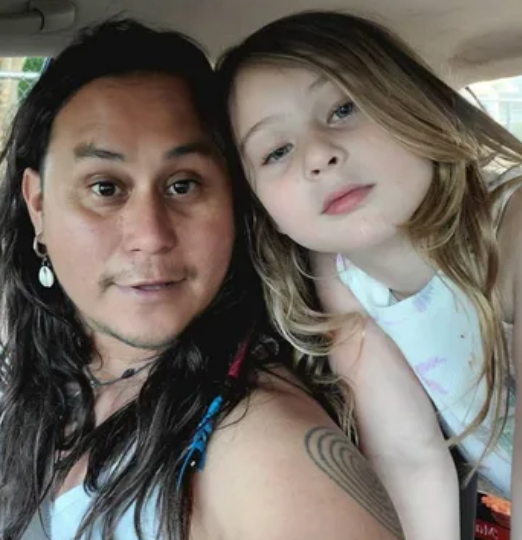
- Details
- By Darren Thompson
Johns, an artist, father, and activist, remains in critical condition as a result of the shooting where a group of Indigenous organizers, women, and elders were celebrating the postponement of the re-dedication of former New Mexico Governor Juan de Oñate’s statue.
“Last week’s premeditated shooting is just another historical event in a series of traumatic events in Indigenous history,” Jacob John’s family said in a statement. “That this intentional, premeditated act of violence was perpetrated against a peaceful prayer camp, located at the former Oñate statue draws attention to the lengthy history of injustices against Black, Indigenous, and People of Color by dehumanizing systems and divisive ideologies the community was protesting.”
The Oñate statue was removed on June 15, 2020, from Alcalde, New Mexico, after many statues of colonial figures were toppled or removed after the murder of George Floyd in Minneapolis on May 25, 2020. Rio Arriba County officials planned to reinstall the Oñate statue on Thursday, September 28 in front of a county annex building, but postponed the reinstallation after community members asked country officials to delay the statue re-dedication earlier in the week.
“We call on the media and public officials to stop naming the perpetrator and sharing his image or video of the incident and instead keep attention where it belongs: on healing and the cause of justice,” the family of Jacob Johns said in a statement on October 3, 2023. “The horrific and racist incident happened last week while Tewa (Española) community members held a sacred ceremony and protested the reinstallation of a statue honoring a Spanish conquistador.”
The family expressed that it wants the public to know that the shooting incident was not a clash between protestors, as it has been described by some outlets. “Indigenous community members were conducting a peaceful and spiritual assembly when they were attacked and made victims of an attempted mass murder,” they said in a statement.
The family then said that the shooter’s gun had jammed, and if it had not, more people would have been injured or killed.
Red Nation, the organizer of the protest, then turned peaceful celebration, said in a press release on September 30, that eyewitnesses confirmed that after the initial shot that struck Jacob Johns in the torso, the shooter adjusted his aim and pulled the trigger a second time while aiming at another attendee, but the gun jammed.
The shooter then ran to a nearby parking lot and sped off in a white Tesla. He was later apprehended eleven miles away in Pojoaque, New Mexico by New Mexico State Police.
Jacob John’s family shared that the physical, mental, and emotional trauma the event caused to him will be lifelong, but that Jacob is not the only victim in the shooting.
“The physical trauma was with Jacob, but there are other emotional traumas that were inflicted on the full community, including the women, children, and elders that were present that day, and their stories must be told,” the family said.
According to the family and others, the shooter was removed earlier by police for disruptive behavior; but the police left, leaving the crowd of largely Indigenous people, including women and elders, vulnerable to already identified threats.
The shooter remains in custody, and the family is asking for the local district court to keep the shooter in jail and for prosecutors to add a federal hate crime modifier to the charges. “This was a racially and culturally motivated hate crime and must be treated as such,” the family said.
The family has organized a GoFundMe for Jacob’s medical expenses and has raised more than $220,000.
More Stories Like This
Native News Weekly (August 25, 2024): D.C. BriefsNavajo Nation Mourns the Passing of Former Vice President Rex Lee Jim
Deb Haaland Earns Endorsement From Communications Workers of America Local 7076
University Soccer Standout Leads by Example
Two Native Americans Named to Democratic Congressional Campaign Committee's“Red to Blue” Program
Help us defend tribal sovereignty.
At Native News Online, our mission is rooted in telling the stories that strengthen sovereignty and uplift Indigenous voices — not just at year’s end, but every single day.
Because of your generosity last year, we were able to keep our reporters on the ground in tribal communities, at national gatherings and in the halls of Congress — covering the issues that matter most to Indian Country: sovereignty, culture, education, health and economic opportunity.
That support sustained us through a tough year in 2025. Now, as we look to the year ahead, we need your help right now to ensure warrior journalism remains strong — reporting that defends tribal sovereignty, amplifies Native truth, and holds power accountable.
 The stakes couldn't be higher. Your support keeps Native voices heard, Native stories told and Native sovereignty defended.
The stakes couldn't be higher. Your support keeps Native voices heard, Native stories told and Native sovereignty defended.
Stand with Warrior Journalism today.
Levi Rickert (Potawatomi), Editor & Publisher

